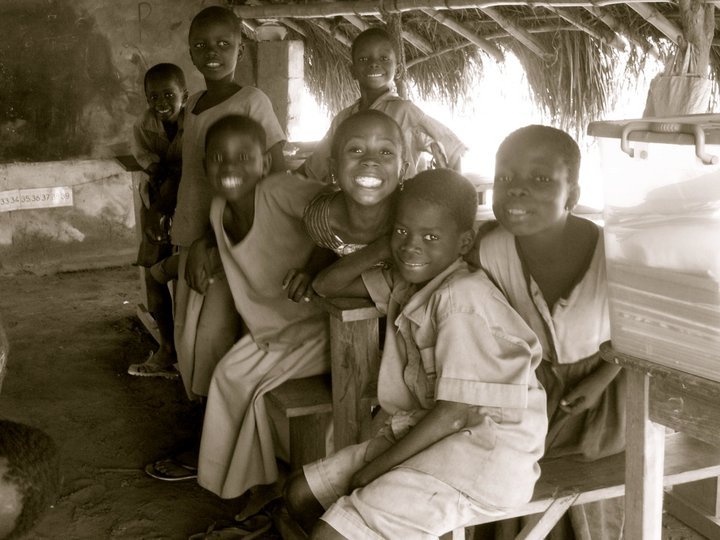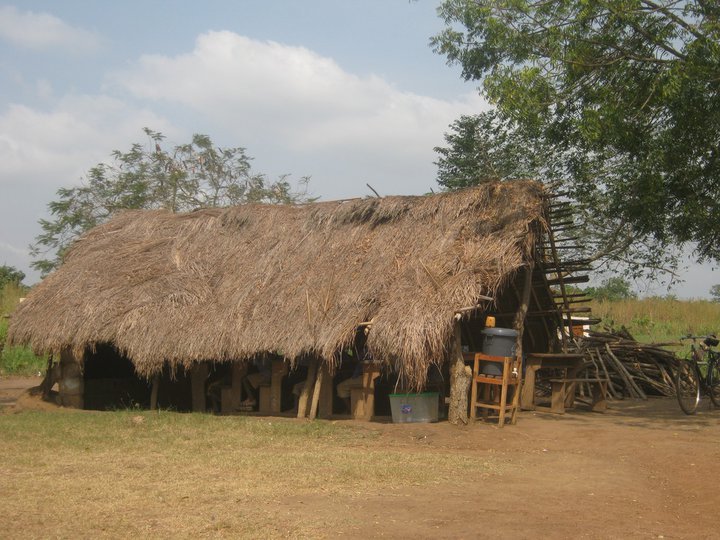
This is a post from two years ago today. I was teaching in a small school in Togo, West Africa where I had the wonderful experience of watching my students switch on as independent learners, discovering the young activists within. I am one very lucky teacher!
Every once in a blue moon, I have an experience with my students that reminds me of how lucky I am to be a teacher -- how magical my profession is. Yesterday was a blue moon day. Today, I am disappointed that I can't be there to follow it up.
****
I've been awake most of the night, fighting back the migraine brought on by the meds that are battling my round of Togo malaria. At 0600 hours, the white flag was waved. My bed will be my office today; the only work to be done is recover through rest. This is proving difficult because where I want to be is with my students, to soak up their glow. I've been watching the clock for the last three hours, ticking through their routines.
8.00: Their journals are out and they are wondering why I haven't posted the topic on the board. Homework is ready to be reviewed for most, still shoved in the belly of the backpack for some.
8.10: They are gathering their reading materials and are negotiating (the term we've agreed to use rather than "arguing") who will partner with whom, and who will get to read the U.N. Peacekeeper's book.
8.50: They are eager to talk about the friendly letters that they are learning how to write so that they may correspond with the children in a neighboring village school.
Disappointment sets in that today I won't experience reflection circle time, a ritual we enact every time a moment of significant learning has taken place in the classroom. Yesterday was a significant day for my students: they were switched on as agents of change.
My students have been engaged in a unit of inquiry entitled: Working Together to Make a Change. We have been working under the central idea: International organizations and individuals work together towards having an impact on global issues. Throughout the unit, we have looked at the work of the U.N. and various NGOs. At one point, I made a request for speakers to come into the classroom to talk with my students about work that they do/have done to have an impact on global issues.
When they met UNICEF ambassadors, my students were thrilled with the blue and white U.N. caps they were given, and thought it was "pretty cool" that they heard from the West African representative to the EU. He did, after all, have an "awesomely funny accent." I was starting to worry that the subject matter of our unit might be too much for their nine-year-old selves to really understand on a deep level. And then yesterday we had a visit from "the most superb person ever," who made the kids want to "Change their whole life plan." (Aside wonder: Did I say I had a life plan at 9?!?!?!) This visit proved to be an amazing assessment that provided far greater evidence than any written test ever could that my students were switched on and understanding the idea.
The day of the life-plan-changing-visit started out with a lively buzz: the journal topic was to "brain storm" questions for our visiting guest. I eaves-dropped on my eleven little year five wonders as they compared questions and consulted one another on how to best phrase the query in English.
I heard things like: "We should totally ask if she has worked for the U.N. before."
This started a debate.
"Well, you can ask that, but really, you should be more specific. Me, I will ask if she ever worked for UNICEF before. Like this, you will know more about the work that she does. "
A lively Spanish accented boy chimed in, "Well me, I want to know how her work helps to make peace."
The child of an international business man pondered "What about my country? Does this lady also work in India? We could share ideas."
Before the visitor came in, we reviewed the role of NGOs and how they worked with the U.N. I have never seen my students so engaged, their adolescent faces wearing the mask of ambassadors being briefed for a meeting with the Queen of Hope.
When Aimee, the guest speaker, arrived the children were skeptical. Her youthful appearance and tiny frame didn't seem to measure up with their notion of how an NGO founder should look. Her voice was childlike and sweet, her eyes sparkly with joy. I could see doubt and the shadow of disappointment cross over my student's faces.
Ms. Threlfall had been mistaken; there is no way this woman was the person who founded a major NGO.
"Aimee's story is inspiring," I had reported. "At the age of 14, she started an association that would help children get to school. Now 23, her organization is a registered NGO which partners with organizations in France, Germany, and the UK. Two Togolese village schools have been opened as well as a free public library in the center of Lomé. She had worked with UNICEF and CHILD AID."
"She wasn't much older than you when she started," I said, with a hope to get them excited and engaged.
Though dubious that the right person was standing before them, my students gave their full attention. After introducing themselves, they sat with arms folded, daring this small woman to prove she was as amazing as Ms.Threlfall had claimed.
Aimee started by explaining that, when she was around nine-years-old, she started to listen to a radio program on Togo Radio that gave African children the opportunity to call in and voice their troubles. Aimee heard Togolese child after Togolese child call in with the same stories: they couldn't go to school because their parents couldn't afford the fees. They couldn't go to the doctor or buy medicines to treat illnesses because there wasn't any money. Drinking water wasn't clean where they lived. They were being beaten and abused. The stories were nearly always variations of the same tale.
The stories these children told the radio audience did not mirror Aimee's life experience. Though Aimee's parents were not wealthy, they had enough to send her to school, and she always had food to eat. When she was 14, one of her best friends stopped reporting to school. Missing her best friend, Aimee sought her out to find out why. It turned out that this young girl's parents couldn't afford the school fees anymore. This reminded Aimee of all of the children she heard on the radio, and left her feeling that she must do something. Her school fees were due at the time, so Aimee came up with a plan. She told her parents that the cost of school had gone up-by double the amount. The extra money would be used to pay the friend's fees. By this point in the young Robyn Hood's account, my students were leaning in, small smiles on their faces, their body language screaming that they wanted to know more. They all interrogated at once.
"What happened?"
"Did your parents find out?"
"Did your friend come to school again? "
"Me, I would be sooo busted!!!"
Aimee went on to report that her parents did in fact find out. Not knowing that it had all been a plan carried out in secret, the friend's parents came by to say thank you to Aimee's parents for paying the fees. The do-gooder was caught, and she was scared: she had never lied to her parents before. How would they respond?
To everyone's surprise, Aimee's parents were proud of her for looking after others. Though they wished they had been told, they knew that their daughter had good intentions, and so rather than punish her, they encouraged her to do more. Aimee was told to start an association to help more children. That was almost 10 years ago. Today, Aimee's organization has taken on a life of it's own. With two schools opened, a library, water projects, and an upcoming environmental/ agricultural project, this humble young lady has started a movement in Togo that empowers young children to take action. My students were so lit-up, their eyes had taken on the same sparkle that Aimee's carried when she entered the room. When Aimee asked if there were questions, twenty-two hands shot into the air: each child was hopping out of their seat, both hands raised, wanting to be the one to first enquire.
Aimee and my students engaged in the most lively repartee I have ever witnessed from my students. Their questions were, as we teachers say, "higher-order" in nature, showing that they truly understood the material we had been covering over the past few weeks. Usually watching the clock for lunch time, they had missed the lunch bell and moaned with disappointment when I said it was time to close our session. The last question came from the student who is usually the least engaged: "Ms. Aimee, how can we help you help the children of Togo?"
My students are now scheduled to travel to one of the village schools next Thursday. Over lunch, they discussed what they would bring to the school to help the children with lessons. If they had it their way, every book and pencil we have would be on the bus with us, to be given away so that others could learn.
When I started this unit of inquiry, I had planned to make the final assessment an activity in which the students made up their own pretend dream NGO. Their make believe organizations would have to have a clear purpose that addresses an issue they care about. When we departed school yesterday, the students were asking if they could create a real NGO instead. "We want to do what Aimee did! Can't you change the assessment?" It isn't often that we get to see our students begging for a more challenging assessment.
What my students don't realize is that they have already "passed the test." They have demonstrated that they understand the need to work together to have an impact on global issues. They understand that they must be active citizens who are willing to serve as agents of change. Though I provided provocation for this realization, they reached the conclusion on their own.
Today, as I lie in bed be-groaning the slow progress of my malaria recovery, (didn't I take those meds four hours ago?!?!) reading the Facebook posts of other teacher friends counting down the days to winter break, (as I would normally be doing this time of year) I am counting down the minutes until I get to see my students again. I want to check to make sure that the sparkle is still there, to sit in a reflection circle and hear what they plan to do now that they know that they, too, can help make a change. Their light switch moment has awakened in me a new vigor as a teacher, a new urgency to nurture their growth, a new love for who they are as young people. For now, all I can do is wait and wonder 'What are they up to now?' I hope it is something like this:
10.34: Year five students are planning to make the word a better place...
To learn more about the Kouvé school and Aimee's work, go to this website.
Are you a teacher? What light switch moments have you observed with your students?


